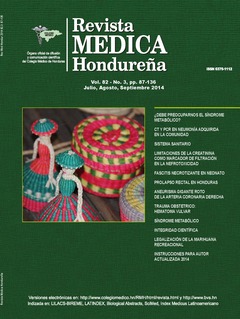Prognostic value of PCT and CRP as markers of severity in community acquired pneumonia in older adults
Keywords:
community acquired pneumonia, procalcitonin, C-reactive proteinAbstract
Background: Community-acquired pneumonia (CAP) is a major cause of mortality worldwide. C reactive protein (CRP) can identify critically ill patients. Procalcitonin (PCT) has been referred to as a sensitive marker of severity of bacterial infection and sepsis. Methods: A prospective cohort study was performed in the geriatric unit Centro Médico ISSEMYM, Metepec, Mexico with all patients admitted to the hospital with a diagnosis of CAP from May 2012 to March 2013. CRP, PCT and routine laboratories were measured. For comparison of continuous variables, Student’s t test or Mann Whitney U test were used. To compare categorical variables X2 test was used. For survival analysis the Kaplan-Meier estimator was used. To set the mortality risk, regression model of COX obtaining the Hazard Ratio was used. The Spearman correlation coefficient was used for correlation between serum levels of PCT and CRP. Results: Data from a total of 82 patients were recorded. The average survival when PCT> 0.5 ng/dl was 17 days (95% CI, 11-23 days) versus 26 days (95% CI, 17-35 days) for PCT <0.5 ng/dl (p ≤ 0.01). Conclusions: Serum PCT level greater than 0.5 ng/dl was found to be a prognostic marker in elderly patients with pneumonia.
Downloads
163




